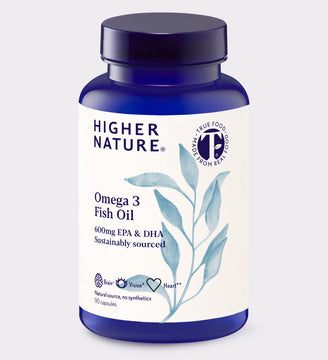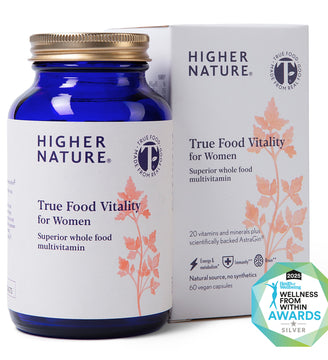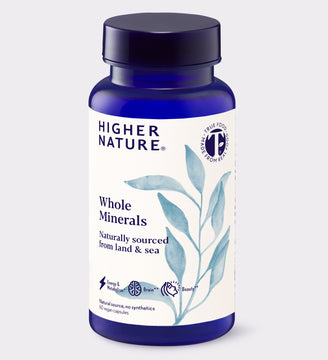
Skin – your body’s natural armour
Higher Nature Nutrition Team
Skin – your body’s natural armour
Skin is your body’s largest organ, serving as natural armour by forming a barrier to keep harmful microbes, chemicals and strong light rays away from more sensitive tissues within the body.
The thinner outer layer of the skin is called the epidermis and contains keratin producing cells which act to toughen and seal the skin. The dermis is the thicker, inner layer which is rich in collagen and elastin fibres, provides the skin’s strength and elasticity.
Not only does the skin act as a barrier to the external environment, but vitamin D – a crucial player in our immunity, is naturally produced through exposure of the skin to the sun’s ultraviolet rays. This stimulates the production of vitamin D3 from a form of cholesterol in the epidermis, or outer layer, of the skin.
So – given its vital importance to health, your skin deserves all the nourishment and protection you can provide!
Nourish
Pack your diet with colourful fruits and vegetables rich in antioxidants which protect skin cells from oxidative stress. Try to avoid stress and swerve the processed and sugary foods which are inflammatory and can aggravate irritated, problem skin as well as disrupting collagen and elastin and making it more difficult for the skin to self-repair.
Cold, clear winter days with low humidity, in addition to the effects of central heating can result in moisture-starved, itchy, sensitive skin, which may be prone to cracking or flaking. So it is especially vital to maintain a good intake of fluids – aim for 2 litres a day, particularly water and herbal teas. Encourage balance in the skin’s natural oil barrier by consuming plenty of essential omega 3 and 6 fats which provide the building blocks of healthy cell membranes. You can increase your intake by eating oily fish such as mackerel or salmon, snacking on walnuts or pumpkin seeds and using flax seed oil in salad dressings.
Sulphur, one of the most abundant minerals in the body, is an important building block for proteins found in the skin as well as the hair, muscles, and connective tissue of the joints. It plays a role in keratin and collagen production and can be found in foods such as garlic, onions, broccoli and other cruciferous vegetables as well as wholegrains, nuts, turkey, eggs, meat, fish and poultry. MSM is a sulphur rich compound that can be supplemented or applied topically to the skin. As the cooler temperatures take hold and the central heating is ramped up, why not indulge in a warm bath followed by liberal application of an MSM-rich lotion?
Protect
Sun exposure is one of the biggest single threats to our skin, although smoking, lack of sleep, poor diet and excessive alcohol consumption also take their toll! Sun exposure generates DNA damaging free-radical molecules as well as making the skin thinner and accelerating the degeneration of collagen and elastin, affecting the skin’s ability to repair.
Antioxidant nutrients are important for skin health as they offer protection against the damage unleashed by free radicals. Vitamin C is widely used by the body and doesn’t just offer collagen support, but acts directly as an antioxidant. Another particularly useful antioxidant for skin health is astaxanthin, a carotenoid found in pink seafood such as salmon and shrimp that is not only good at mopping up free radicals, helping to protect collagen from age-accelerating damage, but has also been shown to minimise the effects of sun exposure including sagging and wrinkling. Other important antioxidant nutrients include vitamins A, C and E and the minerals, zinc and selenium.
Don’t forget that it is not just the sun’s UV rays that cause damage to the skin – blue light or High Energy Visible (HEV) light emanating from our digital devices penetrates deep into the skin with damaging and ageing results – HEV light blocking creams can nourish, hydrate and shield the skin against HEV blue light, reducing its harmful effects.
The skin-gut connection
Your skin is a mirror of your internal health, especially gut health. The skin-gut connection is often overlooked but gut problems can lead to poor absorption of the nutrients that are needed for healthy skin. Not only that – the trillions of bacteria that live in our gut, forming our gut microbiome, need to be supported, as an imbalance can affect immunity and allow the overgrowth of harmful bacteria which may lead to skin breakouts.
Chronic inflammation in the gut has been found to have a significant link to inflammatory skin conditions. Too much sugar, processed foods or alcoholic drinks, as well as ill health, stress and antibiotic use can all upset the balance of bacteria and worsen inflammatory conditions.
So how can you support a healthy microbiota? By choosing live yoghurt and fermented foods such as kefir and sauerkraut you will be providing plenty of probiotic bacteria. And don’t forget to increase your prebiotic consumption – prebiotics are types of dietary fibre that your good bacteria thrive on. They are found in foods such as bananas, chicory, flaxseed, garlic, leeks and onions.
Plump it up
Finally, if you are concerned about the appearance of your skin whether it be fine lines and wrinkles or sagging, you are not alone! From the age of 30 onwards we lose, on average, up to 1.5% of collagen structure per year. This means that skin loses its elasticity and firmness, resulting in these common signs of ageing. However, the good news is that collagen can be supplemented in a hydrolysed form which is partially broken down for better absorption.


















